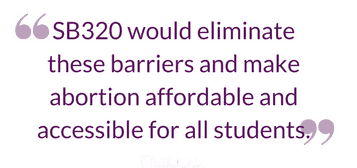On January 9th, during a hearing of the Education Committee for California’s State Senate, over 60 college and medical students – including myself and other members from Medical Students for Choice chapters across the state – walked up to the public microphone, stated their name, and emphasized their support for Senate Bill No. 320 (SB320) as public commentary.
Wearing coordinated grey and pink “JustCare” campaign shirts, we crowded the committee room and lined up in rows, a visual reflection of the bill’s future promise. Together, we had come from all parts of the state, many of us bussing or driving overnight to make it to Sacramento in time.
If passed, SB320 would put California on the path toward becoming the state with the most forward-thinking, sustainable approach to abortion. Introduced by Senator Connie Levya in 2017, the bill would require all on-campus student health centers at public universities in California to provide medication for early pregnancy termination for its students.
Every year, over 3,600 university students in California seek out medication abortion – but they are unable to access this care on campus. While many campus health centers provide high-quality reproductive services, they do not offer abortion services on-site, forcing students to travel off campus for the care they need.
If you’re a student reading this, you know all too well the barriers faced in accessing medical care off campus. Taking time off from classes, homework, jobs or other activities, combined with the cost of transportation or services, can make an already overwhelming task seem impossible. Finals and midterms can become all-consuming, pushing all other life matters out the door.
And, in the case of medication abortion for pregnancy termination – which is only offered up until week 10 of gestation – timing becomes all the more important. If students get caught up in logistical planning and miss this deadline, they will be forced to undergo more complicated, and more expensive, termination procedures. This is often disproportionately the case for low-income students or students of color, particularly in the Central Valley of California, where care is limited.
 SB320 would eliminate these barriers and make abortion affordable and accessible for all students. By providing medication abortion on campus, students will be able to use the reproductive services they need to complete their degrees and finish their educations.
SB320 would eliminate these barriers and make abortion affordable and accessible for all students. By providing medication abortion on campus, students will be able to use the reproductive services they need to complete their degrees and finish their educations.
Meanwhile, offering these services comes at almost no cost to the university health clinics. As was stressed repeatedly at the hearing, medication abortion is a simple, two-pill regimen, and can be prescribed by a range of health providers in California, including nurse practitioners and physician assistants. What’s more, a group of donors has agreed to fund the implementation of the program, meaning the services would come at almost no expense to the state budget.
SB320 is also an inspiring example of the impact of student-led activism. In 2016, undergraduate students at University of California Berkeley started pushing their university government to include medication abortion in their health plan. As they fought to get their voices heard, others in the state listened: just a few months later, Women’s Foundation of California, Access Women’s Health Justice, ACT for Women and Girls and California Latinas for Reproductive Justice came together and proposed the bill to the State Legislature. Today, the bill remains almost entirely student-led, an appropriate locus of power given the population the bill would ultimately effect.
I am happy to say that SB320 passed out of the State Senate Education Committee with strong support, accompanied by silent cheers in the student section (to our frustration: loud cheering is not allowed during committee!). Over the next few months, the bill will be heard in the Senate Floor and Assembly, and hopefully make its way to the Governor’s Desk for signature by the end of 2018.
If it does, we hope other states will look to California as a model for common-sense, grassroots approaches to reproductive rights: after all, sometimes, students really do know best!